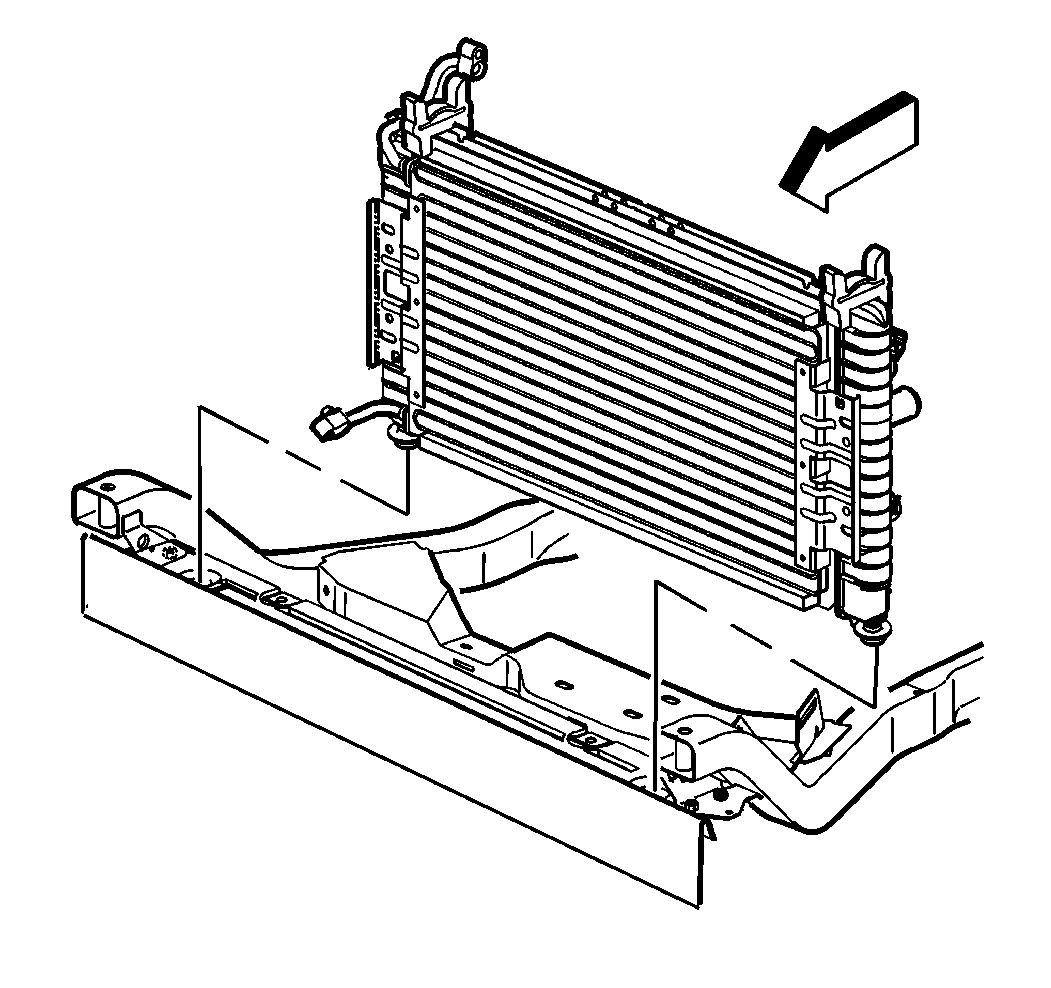Removal Procedure
- Remove the battery. Refer to Battery Replacement in Engine Electrical.
- Remove the battery tray. Refer to Battery Tray Replacement in Engine Electrical.
- Recover the A/C system. Refer to Refrigerant Recovery and Recharging in HVAC Systems with A/C - Manual.
- Drain the cooling system. Recover the coolant. Refer to Cooling System Draining and Filling .
- Remove the upper radiator hose.
- Remove the upper transaxle cooler line.
- Remove the coolant surge tank hose.
- Remove the condenser inlet fitting from the discharge hose.
- Disconnect the cooling fan electrical connection.
- Raise the vehicle. Refer to Lifting and Jacking the Vehicle in General information.
- Remove the lower closeout panel.
- Remove the lower radiator hose from the radiator.
- Remove the lower transaxle cooler line.
- Remove the evaporator line from the condenser outlet.
- Remove the lower radiator mounting panel.
- Remove the radiator, fan and condenser as an assembly from the vehicle.
- Remove the condenser from the radiator.
- Remove the fan shroud from the radiator.
Notice: When adding coolant, it is important that you use GM Goodwrench DEX-COOL™ coolant. If coolant other than DEX-COOL™ is added to the system, the engine coolant will require change sooner: at 50 000 km (30,000 miles) or 24 months.
Caution: Unless directed otherwise, the ignition and start switch must be in the OFF or LOCK position, and all electrical loads must be OFF before servicing any electrical component. Disconnect the negative battery cable to prevent an electrical spark should a tool or equipment come in contact with an exposed electrical terminal. Failure to follow these precautions may result in personal injury and/or damage to the vehicle or its components.

Installation Procedure
- Install the fan shroud to the radiator.
- Install the condenser to the radiator.
- Install the radiator, fan, and condenser as an assembly to the vehicle.
- Install the lower radiator mounting panel.
- Install the condenser outlet to the evaporator line.
- Install the lower radiator hose to the radiator.
- Install the lower closeout panel.
- Lower the vehicle.
- Install the lower transaxle cooler line.
- Install the condenser inlet fitting to the discharge hose.
- Install the coolant surge tank hose.
- Install the upper transaxle cooler line.
- Install the upper radiator hose.
- Refill the cooling system. Refer to Cooling System Draining and Filling .
- Recharge the A/C system. Refer to Refrigerant Recovery and Recharging in HVAC Systems with A/C - Manual.
- Install the battery tray. Refer to Battery Tray Replacement in Engine Electrical.
- Install the battery. Refer to Battery Replacement in Engine Electrical.
- Inspect the cooling system for leaks.
Notice: Use the correct fastener in the correct location. Replacement fasteners must be the correct part number for that application. Fasteners requiring replacement or fasteners requiring the use of thread locking compound or sealant are identified in the service procedure. Do not use paints, lubricants, or corrosion inhibitors on fasteners or fastener joint surfaces unless specified. These coatings affect fastener torque and joint clamping force and may damage the fastener. Use the correct tightening sequence and specifications when installing fasteners in order to avoid damage to parts and systems.
Tighten
Tighten the bolt to 5 N·m (44 lb in).

Tighten
Tighten the bolts to 10 N·m (89 lb in).
Tighten
Tighten the bolt to 25 N·m (18 lb ft).
Install the cooling fan electrical connection.
Tighten
Tighten the bolt to 30 N·m (22 lb ft).
Tighten
Tighten the bolt to 25 N·m (18 lb ft).
Tighten
Tighten the bolt to 30 N·m (22 lb ft).
